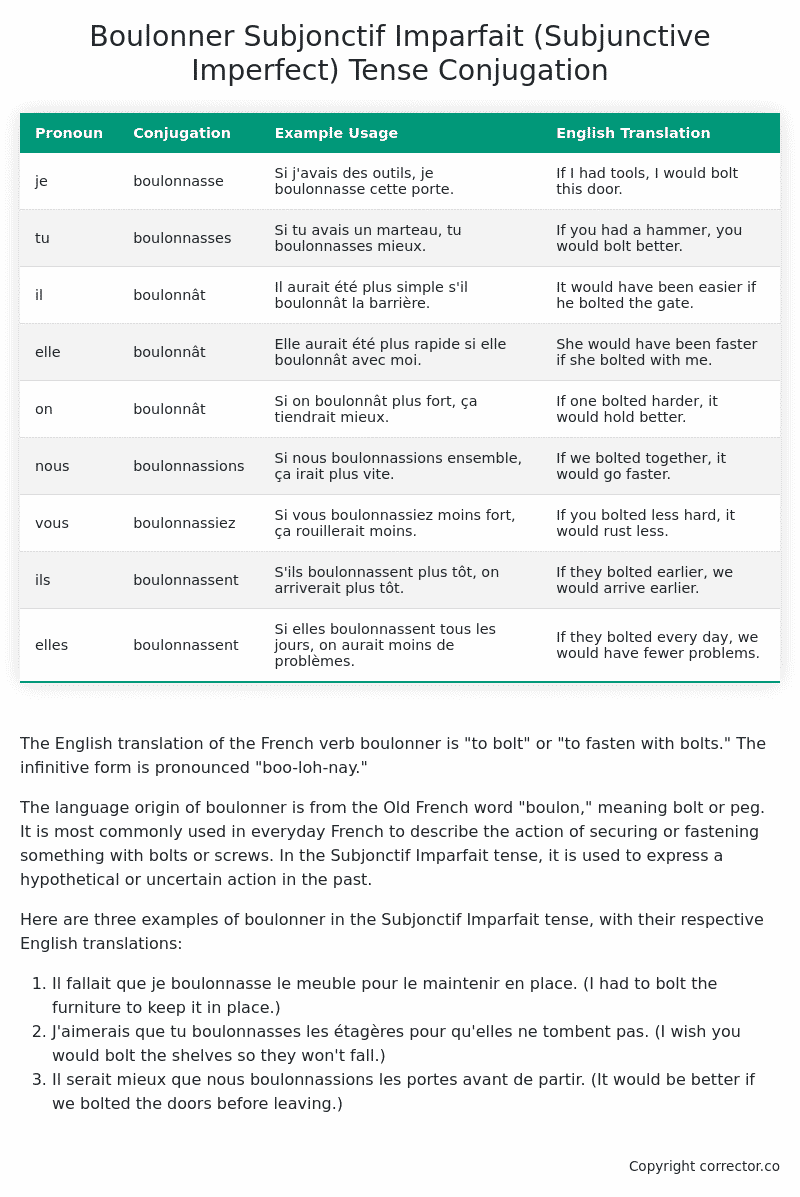Subjonctif Imparfait (Subjunctive Imperfect) Tense Conjugation of the French Verb boulonner
Introduction to the verb boulonner
The English translation of the French verb boulonner is “to bolt” or “to fasten with bolts.” The infinitive form is pronounced “boo-loh-nay.”
The language origin of boulonner is from the Old French word “boulon,” meaning bolt or peg. It is most commonly used in everyday French to describe the action of securing or fastening something with bolts or screws. In the Subjonctif Imparfait tense, it is used to express a hypothetical or uncertain action in the past.
Here are three examples of boulonner in the Subjonctif Imparfait tense, with their respective English translations:
- Il fallait que je boulonnasse le meuble pour le maintenir en place. (I had to bolt the furniture to keep it in place.)
- J’aimerais que tu boulonnasses les étagères pour qu’elles ne tombent pas. (I wish you would bolt the shelves so they won’t fall.)
- Il serait mieux que nous boulonnassions les portes avant de partir. (It would be better if we bolted the doors before leaving.)
Table of the Subjonctif Imparfait (Subjunctive Imperfect) Tense Conjugation of boulonner
| Pronoun | Conjugation | Example Usage | English Translation |
|---|---|---|---|
| je | boulonnasse | Si j’avais des outils, je boulonnasse cette porte. | If I had tools, I would bolt this door. |
| tu | boulonnasses | Si tu avais un marteau, tu boulonnasses mieux. | If you had a hammer, you would bolt better. |
| il | boulonnât | Il aurait été plus simple s’il boulonnât la barrière. | It would have been easier if he bolted the gate. |
| elle | boulonnât | Elle aurait été plus rapide si elle boulonnât avec moi. | She would have been faster if she bolted with me. |
| on | boulonnât | Si on boulonnât plus fort, ça tiendrait mieux. | If one bolted harder, it would hold better. |
| nous | boulonnassions | Si nous boulonnassions ensemble, ça irait plus vite. | If we bolted together, it would go faster. |
| vous | boulonnassiez | Si vous boulonnassiez moins fort, ça rouillerait moins. | If you bolted less hard, it would rust less. |
| ils | boulonnassent | S’ils boulonnassent plus tôt, on arriverait plus tôt. | If they bolted earlier, we would arrive earlier. |
| elles | boulonnassent | Si elles boulonnassent tous les jours, on aurait moins de problèmes. | If they bolted every day, we would have fewer problems. |
Other Conjugations for Boulonner.
Le Present (Present Tense) Conjugation of the French Verb boulonner
Imparfait (Imperfect) Tense Conjugation of the French Verb boulonner
Passé Simple (Simple Past) Tense Conjugation of the French Verb boulonner
Passé Composé (Present Perfect) Tense Conjugation of the French Verb boulonner
Futur Simple (Simple Future) Tense Conjugation of the French Verb boulonner
Futur Proche (Near Future) Tense Conjugation of the French Verb boulonner
Plus-que-parfait (Pluperfect) Tense Conjugation of the French Verb boulonner
Passé Antérieur (Past Anterior) Tense Conjugation of the French Verb boulonner
Futur Antérieur (Future Anterior) Tense Conjugation of the French Verb boulonner
Subjonctif Présent (Subjunctive Present) Tense Conjugation of the French Verb boulonner
Subjonctif Passé (Subjunctive Past) Tense Conjugation of the French Verb boulonner
Subjonctif Imparfait (Subjunctive Imperfect) Tense Conjugation of the French Verb boulonner (this article)
Subjonctif Plus-que-parfait (Subjunctive Pluperfect) Tense Conjugation of the French Verb boulonner
Conditionnel Présent (Conditional Present) Tense Conjugation of the French Verb boulonner
Conditionnel Passé (Conditional Past) Tense Conjugation of the French Verb boulonner
L’impératif Présent (Imperative Present) Tense Conjugation of the French Verb boulonner
L’infinitif Présent (Infinitive Present) Tense Conjugation of the French Verb boulonner
Struggling with French verbs or the language in general? Why not use our free French Grammar Checker – no registration required!
Get a FREE Download Study Sheet of this Conjugation 🔥
Simply right click the image below, click “save image” and get your free reference for the boulonner Subjonctif Imparfait tense conjugation!

Boulonner – About the French Subjonctif Imparfait (Subjunctive Imperfect) Tense
Formation
Common Everyday Usage Patterns
Interactions with Other Tenses
Subjonctif Présent
Indicatif Passé Composé
Conditional
Conditional Perfect
Summary
I hope you enjoyed this article on the verb boulonner. Still in a learning mood? Check out another TOTALLY random French verb conjugation!


